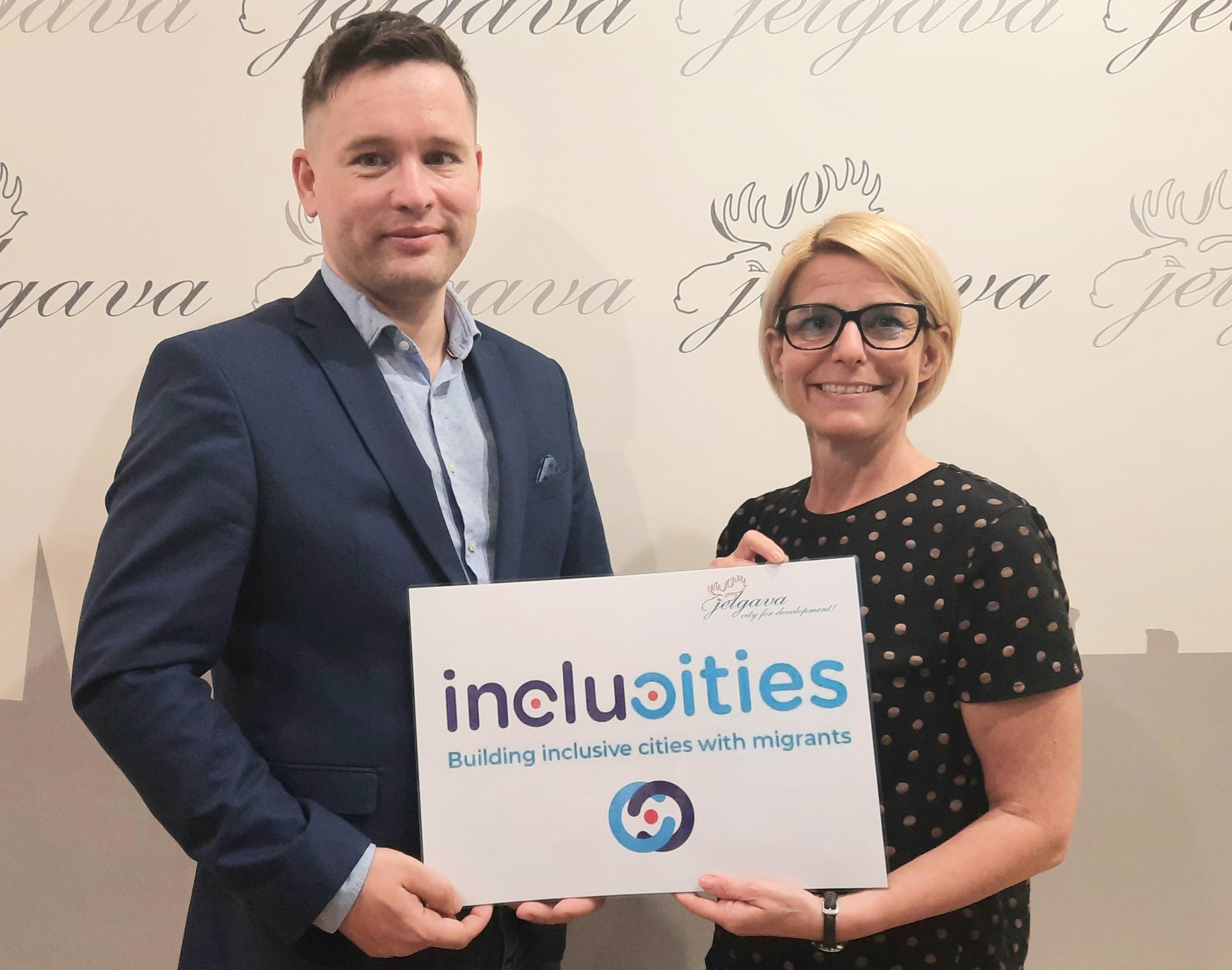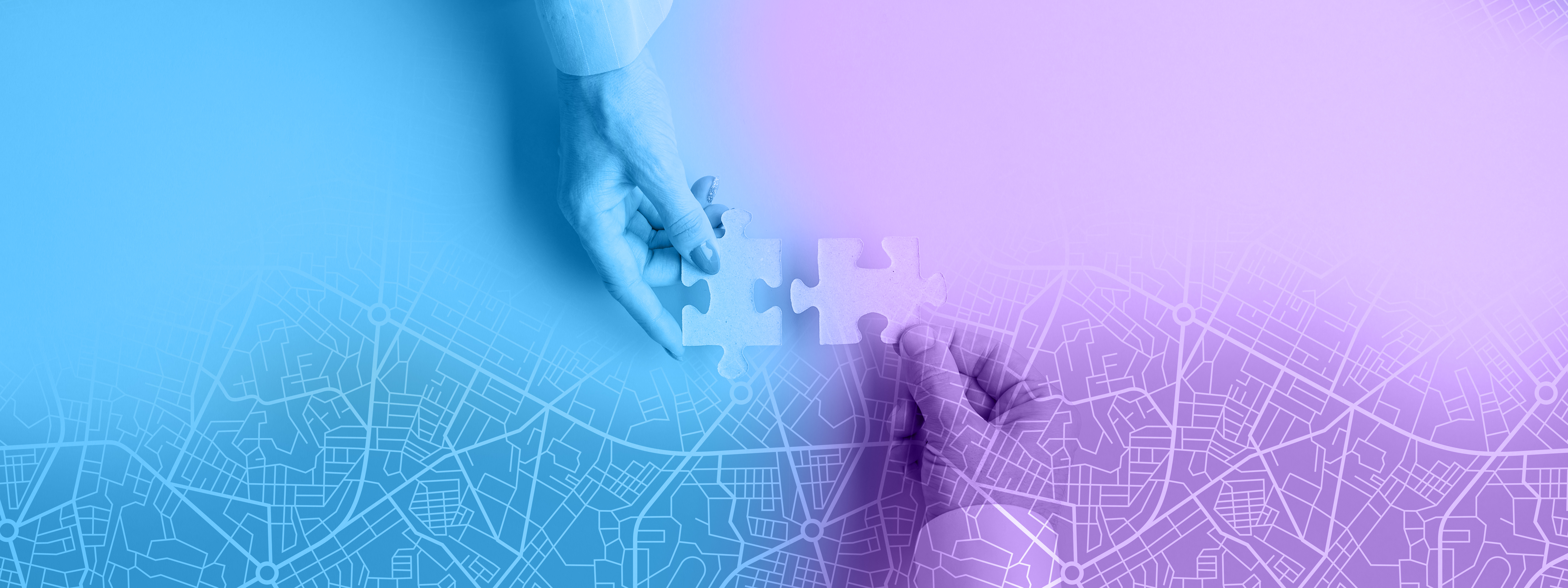The exchange of experiences among cities is the key to success

Currently, there are over 1500 Ukrainian refugees living in the Jelgava in Latvia. Due to the rapid and unpredicted migration flows, Jelgava had to set up an operational information centre to offer newcomers immediate support in registering and accommodation. The city, which is not used to hosting so many people from elsewhere, has warmly welcomed the refugees fleeing war.
During our IncluCities study visit to Latvia, we talked to Gints Reinsons, director of the city’s Municipal Operational Information Centre. He discussed the social and financial challenges his city is facing in this crisis, as well as the benefits of city-to-city cooperation to welcome newcomers and foster inclusive cities.
—----------------------------------
Since its independence in 1991, Latvia has been an emigration country, with more citizens leaving than migrants arriving. Who were the people on the move?
The first emigrants from Latvia in the nineties were mostly Russians who were living in this territory and emigrated to Russia after the country gained its independence. The second wave of emigration happened when the economic crisis hit in 2008. In 2015, with the refugee crisis, a few Syrians came to Latvia; but not for long, as we were never a final destination. The weather is not so good here and the language is a problem.
The ongoing migration wave started this year with the Russian invasion of Ukraine. This is by far the biggest one we have ever experienced in Latvia. An important milestone in terms of the perceptions of migration was the arrival of the international students at Jelgava’s University. With students, I think people got used to diversity.
Have you ever experienced any troubles, discrimination, hate speech, fear followed by misinformation?
I wouldn’t say we have built extremely negative emotions towards migrants, like hate or anger. No. I would say it’s more like you are cautious about something you don’t know. Colours are different, they talk different, you don’t know what you don’t understand, and you need time to adapt. Over the past 5 years, we’ve done that. It’s all around the news. I think people understand that migrants and refugees aren’t here to conquer the country but because they need help.
Of course, there were also people, refugees and migrants who were used for the conflict we faced not so long ago. What was going on in 2021 on the Belarusian borders with Lithuania, Poland and Latvia was a hybrid war. Tens of thousands of immigrants from Belarus on the border of these countries were just a tool to shift the focus from real political issues in Belarus.
Integration is, in general, the responsibility of national governments. But the role of local governments is increasingly coming to the forefront. What is the situation in Jelgava?
We see integration currently as an emergency situation – therefore, it’s a civil protection committee responsible for it, with the mayor of the city as the chairman. We are the ones who are in charge of checking what is the status on the ground, gathering information, updating numbers, reporting on issues related to the refugees from Ukraine, and alerting on what is lacking in legislation to improve their living conditions. We also have to decide how many people we can welcome in the city, as our capacities are limited.
On a day-to-day level, it’s all about reception, housing, social services, inclusion, education, and employment. Several organisations responsible for different issues and coordination went from social institutions to our operation centre and the city management. We also prepare data for the government. So at the moment, integration is on us, the local level.
What about financially? How sustainable is your work taking into account the fact that the war in Ukraine will apparently not end so soon?
If we take a look at our yearly budget for this year, then the numbers don’t sum up. Impossible to take care of all the people in need and do all the activities within the budget planned. The management of this crisis presents a huge financial burden. In one way, we are lucky in this unfortunate situation because this crisis is happening in the first quarter of the year. If it would be towards the end of the year when the municipal budget is already partly spent, it's hard to imagine what would happen.
How many refugees from Ukraine are you hosting and what are the main challenges and issues?
In the territory of Jelgava, we have registered 1500 refugees from Ukraine. The main issue is the onboarding. Giving newcomers the possibility to start a new life. The good part is that the Russian language is quite common in Latvia, as about thirty per cent of the population in Latvia are Russians. So Ukrainians can survive here without knowing Latvian if they speak Russian. So language is not the main problem, but accommodation and labour market integration are.
Right now they live in hostels or use students’ facilities, but that’s not a sustainable solution. The issue is we don’t have other options. We don’t have free apartments where they could stay. One possibility is turning this temporary solution into long-term housing options, keeping direct financial effects in mind. If not, we should find a more sustainable way to accommodate these people.
It’s hard to predict the future because a lot of decisions related to refugees are not related to what they wish but rather to what’s going on with Russia, with the war in Ukraine. We don’t know how many will stay here. And if they stay, will they be able to pay the rent for an apartment? Having a job and regular income is the most important thing and, at the same time, for us, the biggest challenge.
What is the role of local governments and their associations in the reception of Ukrainian refugees?
During the war’s first two weeks, NGOs on the ground were very active in collecting information from the private sector on who wanted to hire and what are the needed profiles. The municipality provided space to register, space to collect clothes and other means. In the early stage, we were also collecting food and other medical equipment to be sent to Ukraine. We activated all social media channels, we had to create a clear strategy and mainstream our communication. That’s, I guess, our main role: coordinating together with the NGOs the work on the ground. The associations of local and regional governments are somewhere between the national and local level. They gather information from different stakeholders on the ground and report the key findings and developments to the national government.
What is the main thing you have learned from this crisis?
From the civil protection perspective, this is a very good opportunity. Until now, we had had only theoretical guidelines, but in this situation, we had to develop a functional system. We have developed a civil protection plan which consists of 35 identified risks. We have the procedure from A to Z on how to navigate a migration crisis.
We see how we adapted and how we synchronised different governmental systems. We are fortunate we were able to develop this system to welcome refugees, a system that works and could potentially be replicated in other crises.
Integration of newcomers through language learning and acquiring knowledge of the Latvian history and traditions is a long-term goal of integration that you are also developing through IncluCities. Why is this important?
Normally this mechanism has to be embedded in all countries and, as I understand it, in Western Europe this system is already included. If you wish to integrate, get a proper job, and become part of the community, you have to learn the language. From another point of view it is unclear how important this will be in Latvia, as we don’t know how long these people will stay. However, we give them the opportunity to learn and even if they get only the basics – greeting people on the street and saying thank you – it’s something that can improve their lives while they are here. However, learning the language is not a priority. We are practically in a bilingual country, where most people speak Russian, the language that also the majority of Ukrainians speak.
How do you see the element of city-to-city collaboration in the integration processes?
The exchange of experiences among cities is the key to success. Even if you only take one tiny element, like a two-day study trip to another city, it can already help you to see responses to problems from a different perspective. So yes, this is an excellent way to progress, to find more sustainable solutions. Of course, we have different legislations, different GDPs, different distances from the impacted areas. and different local contexts, but even a minor inspiration can make a change in the way we see and approach similar problems.

